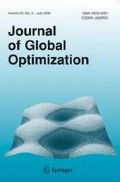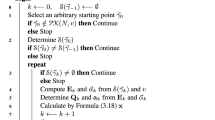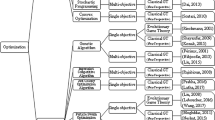Abstract
We provide motivations for the correlated equilibrium solution concept from the game-theoretic and optimization perspectives. We then propose an algorithm that computes \({\varepsilon}\) -correlated equilibria with global-optimal (i.e., maximum) expected social welfare for normal form polynomial games. We derive an infinite dimensional formulation of \({\varepsilon}\) -correlated equilibria using Kantorovich polynomials, and re-express it as a polynomial positivity constraint. We exploit polynomial sparsity to achieve a leaner problem formulation involving sum-of-squares constraints. By solving a sequence of semidefinite programming relaxations of the problem, our algorithm converges to a global-optimal \({\varepsilon}\) -correlated equilibrium. The paper ends with two numerical examples involving a two-player polynomial game, and a wireless game with two mutually-interfering communication links.
Similar content being viewed by others
References
Nash J.: Non-cooperative games. Ann. Math. 54(2), 286–295 (1951)
Debreu G.: A social equilibrium existence theorem. Proc. Natl. Acad. Sci. 38(10), 886–893 (1952)
Fan K.: Fixed-point and minimax theorems in locally convex topological linear spaces. Proc. Natl. Acad. Sci. 38(2), 121–126 (1952)
Glicksberg I.L.: A further generalization of the Kakutani fixed point theorem, with application to Nash equilibrium points. Proc. Am. Math. Soc. 3(1), 170–174 (1952)
Fudenberg D., Tirole J.: Game Theory. The MIT Press, Cambridge (1991)
Topkis D.M.: Supermodularity and Complementarity. Princeton University Press, Princeton (1998)
Monderer D., Shapley L.S.: Potential games. Games Econ. Behav. 14(1), 124–143 (1996)
Rosen J.: Existence and uniqueness of equilibrium points for concave n-person games. Econometrica 33(3), 520–534 (1965)
Huang J., Berry R.A., Honig M.L.: Distributed interference compensation for wireless networks. IEEE J. Sel. Areas Commun. 24(5), 1074–1084 (2006)
Popescu O., Popescu D.C., Rose C.: Simultaneous water filling in mutually interfering systems. IEEE Trans. Wirel. Commun. 6(3), 1102–1113 (2007)
Scutari G., Palomar D.P., Barbarossa S.: Competitive design of multiuser MIMO systems based on game theory: a unified view. IEEE J. Sel. Areas Commun. 26(7), 1089–1103 (2008)
Scutari G., Palomar D.P., Barbarossa S.: The MIMO iterative waterfilling algorithm. IEEE Trans. Signal Process. 57(5), 1917–1935 (2009)
Arrow K.J.: Social Choice and Individual Values. Yale University Press, New Heaven (1963)
Maheswaran R., Başar T.: Efficient signal proportional allocation (ESPA) mechanisms: decentralized social welfare maximization for divisible resources. J. Sel. Areas Commun. 24(5), 1000–1009 (2006)
Arslan G., Demirkol M.F., Song Y.: Equilibrium efficiency improvement in MIMO interference systems: a decentralized stream control approach. IEEE Trans. Wirel. Commun. 6(8), 2984–2993 (2007)
Lasaulce S., Debbah M., Altman E.: Methodologies for analyzing equilibria in wireless games. IEEE Signal Process. Mag. 26(5), 41–52 (2009)
Aumann R.J.: Subjectivity and correlation in randomized strategies. J. Math. Econ. 1(1), 67–96 (1974)
Aumann R.J.: Correlated equilibrium as an expression of Bayesian rationality. Econometrica 55(1), 1–18 (1987)
Nau R., Canovas S.G., Hansen P.: On the geometry of Nash equilibria and correlated equilibria. Int. J. Game Theory 32(4), 443–453 (2004)
Stoltz G., Lugosi G.: Learning correlated equilibria in games with compact sets of strategies. Games Econ. Behav. 59(1), 187–208 (2007)
Stein N.D., Parrilo P.A., Ozdaglar A.: Correlated equilibria in continuous games: Characterization and computation. Games Econ. Behav. 71(2), 436–455 (2011)
Harsanyi, J.: Games of incomplete information played by “Bayesian” Players, I–III. Manag. Sci. 14(3, 5, 7), 159–182, 320–334, 486–502, (1967, 1968, 1968)
Brandenburger A.: Epistemic game theory: an overview. In: Durlauf, S.N., Blume, L.E. (eds) The New Palgrave Dictionary of Economics, 2nd edn, Palgrave Macmillan, Basingstoke (2008)
Siniscalchi M.: Epistemic game theory: beliefs and types. In: Durlauf, S.N., Blume, L.E. (eds) The New Palgrave Dictionary of Economics, 2nd edn, Palgrave Macmillan, Basingstoke (2008)
Brandenburger A.: Epistemic game theory: complete information. In: Durlauf, S.N., Blume, L.E. (eds) The New Palgrave Dictionary of Economics, 2nd edn, Palgrave Macmillan, Basingstoke (2008)
Harsanyi J.C.: Rational Behavior and Bargaining Equilibrium in Games and Social Situations. Cambridge University Press, Cambridge (1977)
Bernheim D.: Rationalizable strategic behavior. Econometrica 52(4), 1007–1028 (1984)
Pearce D.G.: Rationalizable strategic behavior and the problem of perfection. Econometrica 52(4), 1029–1050 (1984)
Aumann R.J., Brandenburger A.: Epistemic conditions for Nash equilibrium. Econometrica 63(5), 1161–1180 (1995)
Gintis, H.: Bayesian rationality and social epistemology. In: The Bounds of Reason: Game Theory and the Unification of the Behavioral Sciences, pp. 133–146. Princeton University Press, Princeton (2009)
Brandenburger A., Dekel E.: Rationalizability and correlated equilibria. Econometrica 55(6), 1391–1402 (1987)
Lewis D.: Conventions: A philosophical study. Harvard University Press, Cambridge (1969)
Aumann R.J.: Agreeing to disagree. Ann. Stat. 4(6), 1236–1239 (1976)
Savage L.: The Foundations of Statistics. Wiley, New York (1954)
Hammond, P.J.: Consequentialism and Bayesian rationality in normal form games. In: Game Theory, Experience, Rationality: Foundations of Social Sciences, Economics and Ethics; In Honor of John C. Harsanyi, pp. 187–196. Kluwer, Dordrecht (1998)
Oaksford M., Chater N.: Précis of Bayesian rationality: the probabilistic approach to human reasoning. Behav. Brain Sci. 32(1), 69–84 (2009)
Han, Z., Pandana, C., Liu, K.J.R.: Distributive opportunistic spectrum access for cognitive radio using correlated equilibrium and no-regret learning. In: Proceedings of IEEE Wireless Communications and Networking Conference (WCNC), pp. 11–15, Hong Kong (2007)
Maskery M., Krishnamurthy V., Zhao Q.: Game theoretic learning and pricing for dynamic spectrum access in cognitive radio. In: Hossain, E., Bhargava, V.K. (eds) Cognitive Wireless Communication Networks, pp. 303–325. Springer, Berlin (2007)
Han Z.: Degrees of cooperation in dynamic spectrum access for distributed cognitive radios. In: Hossain, E., Bhargava, V.K. (eds) Cognitive Wireless Communication Networks, pp. 231–270. Springer, Berlin (2007)
Krishnamurthy V., Maskery M., Yin G.: Decentralized adaptive filtering algorithms for sensor activation in an unattended ground sensor network. IEEE Trans. Signal Process. 56(12), 6086–6101 (2008)
Belmega, E.V., Lasaulce, S., Debbah, M., Hjørungnes, A.: Learning distributed power allocation policies in MIMO channels. In: European Signal Processing Conference (EUSIPCO). Invited paper, Aalborg (2010, Aug)
Hart S., Mas-Colell A.: A simple adaptive procedure leading to correlated equilibrium. Econometrica 68(5), 1127–1150 (2000)
Hart, S., Mas-Colell, A.: A reinforcement procedure leading to correlated equilibrium. In: Economic Essays: A Festschrift for Werner Hildenbrand, pp. 181–200 (2001)
Kong F.W., Kleniati P.M., Rustem B.: Computation of correlated equilibrium with global-optimal expected social welfare. J. Optim. Theory Appl. 153(1), 237–261 (2012)
Lasserre J.B.: Global optimization with polynomials and the problem of moments. SIAM J. Optim. 11(3), 796–817 (2000)
Waki H., Kim S., Kojima M., Muramatsu M.: Sums of squares and semidefinite programming relaxations for polynomial optimization problems with structured sparsity. SIAM J. Optim. 17(1), 218–242 (2006)
Szili L.: On A.E. convergence of multivariate Kantorovich polynomials. Acta Mathematica Hungarica 77(1), 137–146 (1997)
Abel U.: Asymptotic approximation with Kantorovich polynomial. Approx. Theory Appl. 14(3), 106–116 (1998)
Jeffreys, H., Jeffreys, B.S.: Weierstrass’s theorem on approximation by polynomials. In: Methods of Mathematical Physics, Chapter Mean-Value Theorems, 3rd edn, pp. 446–448. Cambridge University Press, Cambridge (1988)
Hart S., Schmeidler D.: Existence of correlated equilibria. Math. Oper. Res. 14(1), 18–25 (1989)
Lorentz G.G.: Bernstein Polynomials, 2nd edn. Chelsea Publishing Company, New York (1986)
Lasserre J.B.: Convergent SDP-relaxations in polynomial optimization with sparsity. SIAM J. Optim. 17(3), 822–843 (2006)
Grimm D., Netzer T., Schweighofer M.: A note on the representation of positive polynomials with structured sparsity. Archiv der Mathematik 89(5), 399–403 (2007)
Vandenberghe L., Boyd S.: Semidefinite programming. SIAM Rev. 38(1), 49–95 (1996)
Borchers B.: CSDP, A C library for semidefinite programming. Optim. Methods Softw. 11(1), 613–623 (1999)
Parrilo P.A.: Semidefinite programming relaxations for semialgebraic problems. Math. Program. 96(2), 293–320 (2003)
von Neumann J., Morgenstern O.: Theory of Games and Economic Behavior. Princeton University Press, Princeton (1944)
Osborne M.J., Rubinstein A.: A Course in Game Theory. The MIT Press, Cambridge (1994)
Curto R.E., Fialkow L.A.: The truncated complex K-moment problem. Trans. Am. Math. Soc. 352(6), 2825–2855 (2000)
Laurent M.: Sums of squares, moment matrices and optimization over polynomials. In: Putinar, M., Sullivant, S. (eds) Emerging Applications of Algebraic Geometry. The IMA Volumes in Mathematics and its Applications, vol. 149, pp. 157–270. Springer, Berlin (2009)
Kuhlmann S., Marshall M.: Positivity, sums of squares and the multi-dimensional moment problem. Trans. Am. Math. Soc. 354(11), 4285–4302 (2002)
Putinar M.: Positive polynomials on compact semi-algebraic sets. Indiana Univ. Math. J. 42(3), 969–984 (1993)
Nie J., Schweighofer M.: On the complexity of Putinar’s positivstellensatz. J. Complex. 23(1), 135–150 (2007)
Kojima M., Kim S., Waki H.: Sparsity in sums of squares of polynomials. Math. Program. 103(1), 45–62 (2005)
Kim S., Kojima M., Waki H.: Generalized Lagrangian duals and sums of squares relaxations of sparse polynomial optimization problems. SIAM J. Optim. 15(3), 697–719 (2005)
Fukuda M., Kojima M., Murota K., Nakata K.: Exploiting sparsity in semidefinite programming via matrix completion I: general framework. SIAM J. Optim. 11(3), 647–674 (2000)
Scherer C.W., Hol C.W.J.: Matrix sum-of-squares relaxations for robust semi-definite programs. Math. Program. 107(1), 189–211 (2006)
Yu W., Rhee W., Boyd S., Cioffi J.M.: Iterative water-filling for Gaussian vector multiple-access channels. IEEE Trans. Inf. Theory 50(1), 145–152 (2004)
Author information
Authors and Affiliations
Corresponding author
Rights and permissions
About this article
Cite this article
Kong, F.W., Rustem, B. Welfare-maximizing correlated equilibria using Kantorovich polynomials with sparsity. J Glob Optim 57, 251–277 (2013). https://doi.org/10.1007/s10898-012-9912-5
Received:
Accepted:
Published:
Issue Date:
DOI: https://doi.org/10.1007/s10898-012-9912-5
Keywords
- Game theory
- Non-cooperative game
- Correlated equilibrium
- Global polynomial optimization
- Sum of squares
- Semidefinite programming
- Wireless communication




